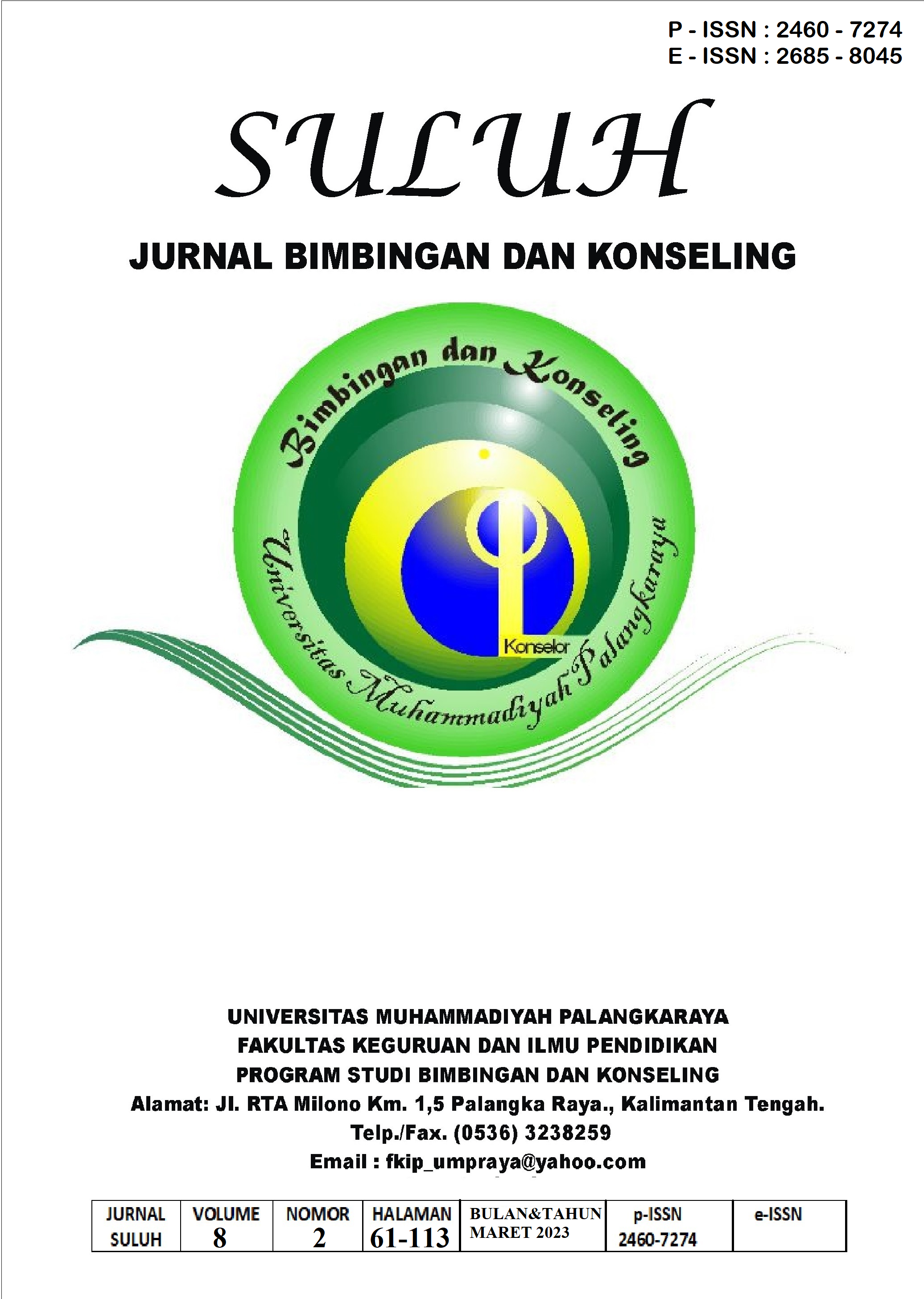The Implementation of Thought Stopping and Cognitve Restructuring Counseling Techniques to improve victim’s of relationship abuse Psychological Well-Being
Main Article Content
Abstract
The aim of this report is to share findings in subject’s psychological condition and the effectiveness of thought stopping techniques by using thought stopping and cognitive restructuring techniques to change subject’s behavior by reducing irrational and intrusive thought as a means to help victim quality of life. The research methods was single case study and observation with an individual, age 27, male. Results shows that thought stopping and cognitive restructuring techniques during counseling session were effective to change subject’s behaviour. This findings supports the idea of thought stopping as a techniques able to help victim’s of relationship abuse psychological well-being.
Downloads
Article Details

This work is licensed under a Creative Commons Attribution-ShareAlike 4.0 International License.
All rights reserved. This publication may be reproduced, stored in a retrieval system, or transmitted in any form or by any means, electronic, mechanical, photocopying, recording.
References
American Psychiatric Association. (2022). Trauma- and Stressor-Related Disorder. In Diagnostic and statistical manual of mental disorders (5th ed., terxt rev.).https://doi.org/10.1176/appi.books.9780890425787.x07_Trauma_and_Stressor_Related_Disorders
Aryani Safithry, E., & Sari Dewi, I. (2020). Terapi menulis ekspresif untuk menurunkan tingkat stres akademik peserta didik di sekolah full day school. Suluh: Jurnal Bimbingan Dan Konseling, 5(2), 40–47. https://doi.org/10.33084/suluh.v5i1.1313
Fatchurahman, M., Setiawan, M. A., & Karyanti, K. (2021). The development of group healing storytelling model in multicultural counselling services in Indonesian schools: Examination of disciplinary cases. The Education and science journal, 23(4), 157-180.
Munandar, H., Herman, H., Putra, D. A., & Nilam, N. (2022). The relationship between positive thinking, social support, and students’ psychological well-being during online learning. Jurnal Psikologi Pendidikan Dan Konseling: Jurnal Kajian Psikologi Pendidikan Dan Bimbingan Konseling, 8(1), 7. https://doi.org/10.26858/jppk.v8i1.24274
Munandar, H., Palangkaraya, M., & Raya, P. (2022). Studi fenomenologi subjective well-being pada pekerja perempuan Phenomenology study of subjective well-being on women workers. Jurnal Psikologi Dan Psikologi Islam, 19(1), 2655–5034. https://doi.org/10.18860/psi.v19i1.15297
Munandar, H., Situmorang, N. Z., & Tentama, F. (2015). Subjective well-being pada pekerja perempuan. Fakultas Psikologi Universitas Muhammadiyah Jember, 1–11.
Ryff, C. D., & Keyes, C. L. M. (1995). The structure of psychological well-being
revisited. Journal of Personality and Social Psychology, 69(4), 719–727.
Ryff, C. D., Almeida, D. M., Ayanian, J. S., Carr, D. S., Cleary, P. D., Coe, C., ...
Williams, D. (2010). National Survey of Midlife Development in the United States
(MIDUS II), 2004-2006: Documentation of psychosocial constructs and composite variables in MIDUS II Project 1. Ann Arbor, MI: Inter-university Consortium for Political and Social Research.
Stanley, I. H., Boffa, J. W. & Joiner, T. E. PTSD from a suicide attempt: Phenomenological and diagnostic considerations. Psychiatry 82, 57–71 (2018).
Van Hooff, M., McFarlane, A. C., Baur, J., Abraham, M. & Barnes, D. J. The stressor criterion-A1 and PTSD: A matter of opinion? Journal of Anxiety Disorders 23, 77–86 (2009).
Vandervoort, D. & Rokach, A. Posttraumatic relationship syndrome: The conscious processing of the world of trauma. Social Behavior and Personality: an international journal 31, 675–685 (2003).

